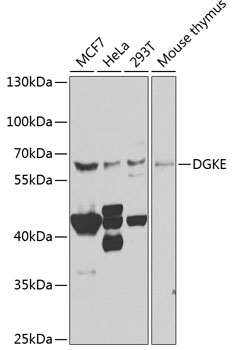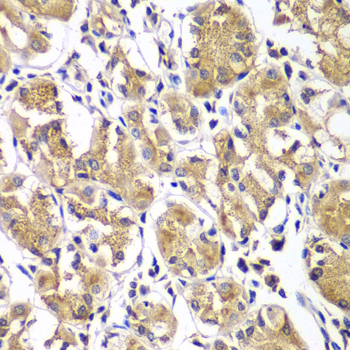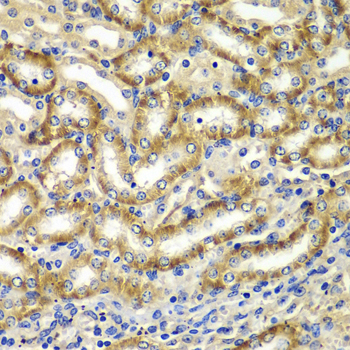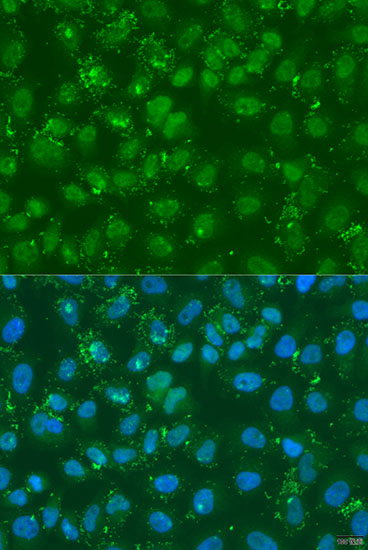-
Product Name
DGKE Polyclonal Antibody
- Documents
-
Description
Polyclonal antibody to DGKE
-
Tested applications
WB, IHC, IF
-
Species reactivity
Human, Mouse
-
Alternative names
DGKE antibody; AHUS7 antibody; DAGK5 antibody; DAGK6 antibody; DGK antibody; NPHS7 antibody; diacylglycerol kinase epsilon antibody
-
Isotype
Rabbit IgG
-
Preparation
Antigen: Recombinant fusion protein containing a sequence corresponding to amino acids 40-260 of human DGKE (NP_003638.1).
-
Clonality
Polyclonal
-
Formulation
PBS with 0.02% sodium azide, 50% glycerol, pH7.3.
-
Storage instructions
Store at -20℃. Avoid freeze / thaw cycles.
-
Applications
WB 1:500 - 1:2000
IHC 1:50 - 1:200
IF 1:50 - 1:200 -
Validations

Western blot - DGKE Polyclonal Antibody
Western blot analysis of extracts of various cell lines, using DGKE antibody at 1:1000 dilution.Secondary antibody: HRP Goat Anti-Rabbit IgG (H+L) at 1:10000 dilution.Lysates/proteins: 25ug per lane.Blocking buffer: 3% nonfat dry milk in TBST.Detection: ECL Basic Kit .Exposure time: 30s.

Immunohistochemistry - DGKE Polyclonal Antibody
Immunohistochemistry of paraffin-embedded human gastric using DGKE antibody at dilution of 1:100 (40x lens).

Immunohistochemistry - DGKE Polyclonal Antibody
Immunohistochemistry of paraffin-embedded mouse kidney using DGKE antibody at dilution of 1:100 (40x lens).

Immunofluorescence - DGKE Polyclonal Antibody
Immunofluorescence analysis of U2OS cells using DGKE antibody at dilution of 1:100. Blue: DAPI for nuclear staining.
-
Background
Highly selective for arachidonate-containing species of diacylglycerol (DAG). May terminate signals transmitted through arachidonoyl-DAG or may contribute to the synthesis of phospholipids with defined fatty acid composition.
Related Products / Services
Please note: All products are "FOR RESEARCH USE ONLY AND ARE NOT INTENDED FOR DIAGNOSTIC OR THERAPEUTIC USE"
